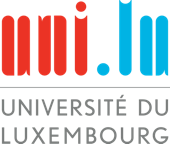
Program
PhD Defence (Thursday, Oct. 24th, Salles des Conseils, Campus Kirchberg)
Workshop (Friday, Oct. 24th, Salles des Conseils, Campus Kirchberg)
Details
Dov Gabbay
An Equational Approach to Probabilistic Argumentation
Pietro Baroni
Uncertainty in Structured Argumentation
The talk aims at surveying and discussing approaches to explicitly encompass uncertainty within structured argumentation models. It will review several paradigmatic literature proposals, analyze some relevant basic conceptual issues and point out some possible directions of future work.
Tjitze Rienstra
Abduction and Dialogical Proof in Argumentation and Logic Programming
We develop a model of abduction in abstract argumentation, where changes to an argumentation framework act as hypotheses to explain the support of an observation. We present dialogical proof theories for the main decision problems (i.e., finding hypotheses that explain skeptical/credulous support) and we show that our model can be instantiated on the basis of abductive logic programs.
Stefan Woltran
Comparing the Power of Different Semantics for Abstract Argumentation
The study of extension-based semantics within the seminal abstract argumentation model of Dung has largely focused on definitional, algorithmic and complexity issues. In contrast, matters relating to comparisons of representational limits, in particular, the extent to which given collections of extensions are expressible within the formalism, have been under-developed. Recent work has addressed this issue in terms of characterizations of the so-called signatures (the entire collection of extensions that can be obtained with a single framework) which allowed for a comparison of semantics in terms of their expressibility. In this talk, we shall highlight these results for the main semantics of abstract argumentation and discuss some further recent developments.
Jean-Guy Mailly
A Bridge between AGM Belief Revision and Abstract Argumentation
Change in argumentation frameworks has been a very dynamic topic in the last years, but as far as we know, very few of these works benefit from the well-known AGM framework for belief revision. We propose two ways to link these topics. First, we have adapted the Katsuno and Mendelzon's version of the AGM rationality postulates to argumentation frameworks, and defined some revision operators satisfying these postulates. The second contribution is a translation-based approach to revise argumentation frameworks: it is possible to encode an argumentation framework with its semantics into a propositional formula f, to revise this formula f with a usual revision operator, and then to decode the revised formula to obtain the revised argumentation frameworks.
Beishui Liao
On imprecise probabilities of semantics of probabilistic argumentation
In recent years, modeling argumentation with uncertainty is gaining momentum. Computing the probability that a set of arguments is an extension is $FP^{\#P}$-complete under some semantics (including complete, grounded, preferred, and ideal). In this paper, we propose an alternative way to evaluate the status of arguments in a probabilistic argumentation graph. The main contributions of this paper consist of the following two aspects. First, notions of uncertain acceptability of arguments and of uncertain extensions of a probabilistic argumentation graph are proposed. Second, based on these notions, we introduce a theory of imprecise probabilities that a set of arguments is an extension.
Dionysios Kontarinis
On the Use of Target Sets for Move Selection in Multi-Agent Debates
Debating agents have often different areas of expertise and conflicting opinions on the subjects under discussion. They are faced with the problem of deciding how to contribute to the current state of the debate in order to satisfy their personal goals. We focus on target sets, that specify minimal changes on the current state of the debate allowing agents to satisfy their goals, where changes are the addition and/or deletion of attacks among arguments. We experimentally test a number of strategies based on target sets, and we evaluate them with respect to different criteria, as the length of the debate, the happiness of the agents, and the rationality of the result.
Martin Caminada
A Discussion Game for Grounded Semantics
We present a discussion game, based on the concept of strong admissibility, where the ability to win the game for a particular argument coincides with the argument being in the grounded extension. Our game is an improvement to the previously stated Standard Grounded Game (SGG) and Grounded Persuasion Game (GPG) in that (1) it requires a number of steps that is linear w.r.t. the strongly admissible set that is being constructed, which is unlike the SGG where the required number of steps can be exponential, (2) whenever an argument is in the grounded extension, the proponent has a winning strategy for the game, which is unlike the GPG where winning the game may depend on the cooperation of the opponent, and (3) the game has a number of features that make it more in line with human discussions.
Location: University of Luxembourg
Venue: Campus Kirchberg, Salles des Conseils.
Date: October 24th, 2014
Organized by:
ICR (Individual and Collective Reasoning Group)
The Computer Science and Communications Research Unit
Contact:
tjitze.rienstra/at/uni.lu






